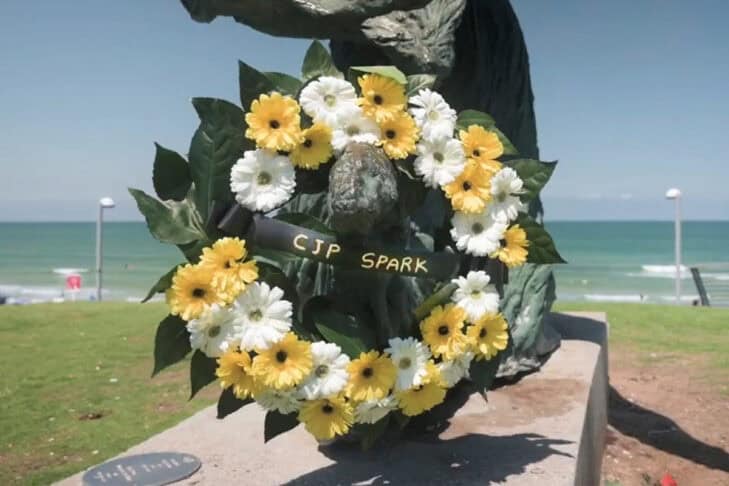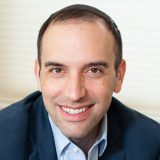It is hard to believe that one year ago over 300 of us traveled to Israel as part of CJP’s historic Spark initiative in honor of Israel’s 75th Independence Day. We literally laughed and cried as we explored our shared past and imagined our shared future, wrestling with questions about Israeli civil society, democracy, and security, even as we walked in the footsteps of our ancestors, soaked in the spiritual grandeur of our homeland, and appreciated the diversity and vibrancy of the “ingathering of the exiles” — the tapestry of contemporary Israeli society. It was memorable and it was magical. And it feels like a lifetime ago.
Last year, we traveled, learned, and connected directly with Israelis, including our extended Greater Boston family in Haifa. There is no more powerful way to commemorate Yom HaZikaron (Israel’s Memorial Day for Fallen Soldiers and Victims of Terror) and celebrate Yom Ha’atzmaut (Israel’s Independence Day) than to be in Israel, together with Israelis, whose lived experience give these two days profound depth and gravitas. Last year, we experienced the depth of these days, and this coming week — as we commemorate and celebrate in this post-October 7 world — our Israeli family is still at war, still in trauma, still desperately waiting for their loved ones held captive in Gaza to come home. Here in the United States, we are seeing Israel-hatred and Jew-hatred like I have never experienced in my lifetime and reeling, not only from the collective trauma of the terror attacks in Israel, but also from our own profound sense of vulnerability and fear as American Jews.
What does it mean to mark Yom HaZikaron when you have just experienced the worst massacre of Jews since the Holocaust in the very sovereign state that exists in part to ensure, once and for all, the safety, security, and dignity of the Jewish People? What does it mean to celebrate Yom Ha’atzmaut amid such grief and loss, while still fighting grueling and tragic battles on multiple fronts, and when it feels like the very future of this young state is hanging in the balance? And what do these two days and the State of Israel mean for American Jews at a time when our historic consciousness of the precariousness of living as a tiny, diasporic minority has been reawakened?
My colleague, Tamar, wrote recently about last year’s Spark journey and what it felt like to be in Israel and to feel “the tangible grief and loss, and the immense unity and joy.” She described how, this year, the grief of Yom HaZikaron will be personal for her because her dear friend was murdered at the Nova festival. These days remind us of the cost of independence and self-determination, the sacrifice, pain, and loss that are, as the Israeli poet Natan Alterman put it, the “silver platter” upon which the Jewish State was given and exists. This year, on Yom HaZikaron, I will be reflecting on these losses in newly acute and painful ways. As I consider the fragility of Jewish life around the world, I feel a new level of gratitude to live at a time in history when we have a sovereign Jewish State.
This gratitude will make this year’s transition from Yom HaZikaron to Yom Ha’atzmaut as poignant as ever for me and celebration will be different. This year, I will be celebrating the strength, resiliency, and spirit of Israelis and the Jewish People, all of which are reflected in the miraculous story of the modern Jewish State and its citizens.
My colleague, Hilla, the director of CJP’s Haifa-Boston Connection, wrote a powerful piece, in which she described how “Israelis are changing. We’re exhausted, in pain, lacking trust — but full of faith and motivation to give everything for the future we want to leave for our children. Everyone is doing something for the good of others and the future….”
This year, I will be celebrating the agency and hope that Hilla describes. The Israeli national anthem is not titled “the arrival” nor “we made it.” Instead, “Hatikva” (“The Hope”) describes the longing, striving, and relentless sense of possibility that led to the creation of Israel and has brought us to this 76th Independence Day. At the heart of Zionism is the belief that rebuilding Jewish life and culture in a safe, secure, democratic Jewish State is essential to the actualization of the ethical, cultural, and spiritual potential of the Jewish People. Zionism is the antithesis of Jewish powerlessness. Zionism is an expression of the belief that we are actors on the stage of history and that we have the agency and the responsibility to build a better future for ourselves and for the world.
That hope, I believe, is miraculous, and it is what I will be celebrating this year.
Sign up to receive Marc’s bi-weekly emails to our community.



